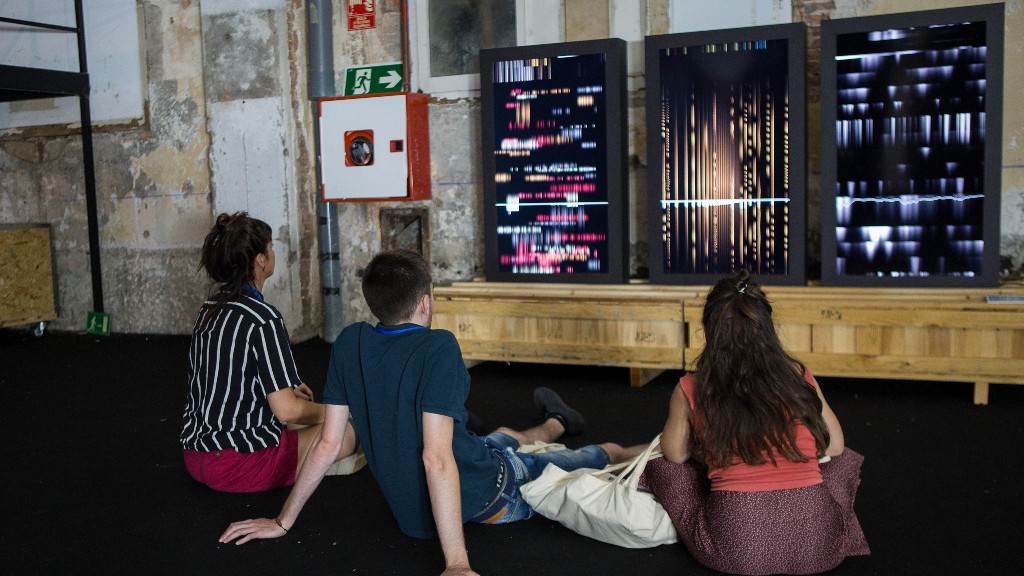The Austrian city of Linz is to host the Ars Electronica Festival from 7 to 11 September. People from the fields of art, science and technology from all over the world will come together to address one of the great challenges facing our society: the climate emergency. The Institut Ramon Llull, in collaboration with the New Art Foundation and the new art, science and technology hub, Hac Te, will be presenting a sample of Catalonia's latest digital works. The six pieces included in this exhibition are mostly the result of the Ars Electronica Garden Barcelona events organized by the Universitat Oberta de Catalunya (UOC), together with other Catalan institutions, in 2020 and 2021. Some of these works have also benefitted from grant programmes, including ISEA2022 Barcelona, a symposium organized by the UOC.
Thanks to the Gardens held in 2020 and 2021, Barcelona has become one of the main off-site locations for the Ars Electronica Festival, the most world's important event dedicated to electronic creation and the synergies between art, technology, science and society. After two years of COVID pandemic, this year the Austrian festival is once again taking place in-person, providing an opportunity to showcase Catalan digital art internationally.
Entitled Collaborative Ecosystems for a Sustainable World, the theme of the Catalan exhibition is that only collaborative practices based on the wide-ranging exchange of knowledge and efforts will enable us to create ideas that lead to a plan for a sustainable world. And collaborative practices are indeed a cornerstone of Catalan innovation.
The six projects that will be exhibited are:
- Tasmanian Tiger by Antoni Muntadas. A new production produced by the New Art Foundation and Hac Te, in collaboration with the Barcelona Institute of Science and Technology (BIST) and the Institute for Bioengineering of Catalonia.
- Do bodies dream of electromagnetic organs? by Esther Rodríguez-Barbero. Ars Electronica Garden 2021. Rodríguez-Barbero received a grant from the UOC, the Institut Ramon Llull, the New Art Foundation, La Caldera and Hangar.
- Forms by Santi Vilanova. Ars Electronica Garden 2020. Vilanova received a grant from the Institut Ramon Llull, the New Art Foundation and Hangar.
- Chemical Ecosystem by Yolanda Uriz Elizalde. Presented at ISEA2022 Barcelona. Uriz Elizalde received a grant from ISEA2022 Barcelona, the UOC, the New Art Foundation, Hac Te and the Ernesto Ventós Foundation.
- Especies I, II y III by Mónica Rikić. Presented at ISEA2022 Barcelona. Rikić received a grant from ISEA2022 Barcelona, the UOC, the New Art Foundation, Hac Te and DKV.
- Tools for a Warming Planet by Sara Dean, Beth Ferguson and Marina Monsonís. Presented at ISEA2022 Barcelona.
Collaborative practices for a sustainable world
Alongside the works on show, Ars Electronica's main stage – the Festival University Stage – will also host a talk on collaborative practices and how proposals for a sustainable world can be created based on these proposals and on sharing knowledge. It will be held on Thursday 8 September and chaired by Pau Alsina, the director of Hac Te, and a researcher and member of teaching staff at the UOC's Faculty of Arts and Humanities. It will involve artist, winner of the National Culture Award 2021, and UOC faculty member Mónica Rikić (Catalonia), architect and designer Sara Dean (California), ecological designer and educator Beth Ferguson (California), and artist and director of La Cuina, MACBA's cooking laboratory, Marina Monsonís (Catalonia).
There will also be a guided tour of the projects in the Collaborative Ecosystems for a Sustainable World exhibition, and a workshop on Tools for a Warming Planet to complete the programme.
Experts UOC
Press contact
-
Editorial department

